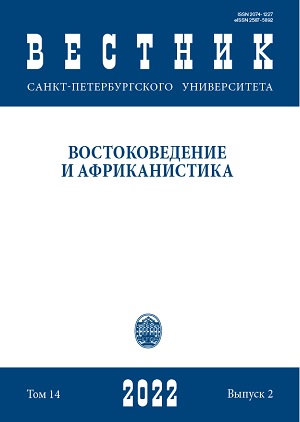“Unity in Language, Thoughts, Deeds”: The Ideas of Ismail Gasprinskii and Conceptualization of Turkic Nationalism in Turkey
DOI:
https://doi.org/10.21638/spbu13.2022.205Abstract
At the last decades of the long 19th century, a prominent Russian Muslim journalist and educator, Ismail Gasprinskii (1851–1914), promoted a cultural-political project for Russian Muslims, which after the Revolution of 1905 gradually shifted to the idea of national-cultural autonomy within Russian empire, long after some of Gasprinskii’s ideas were reinterpreted and he personally became known as a pan-Turkist, especially in the USSR and in Turkey. This case study aims at examining how the image of Ismail Gasprinskii was embedded into pan-Turkic discourse in Turkey. Hence, we focus on key authors, including founders of pan-Turkism Yusuf Akçura and Ziya Gökalp, who initiated the process of portraying Gasprinskii as one of the “ideologists of pan-Turkism”. Following the main aim of the study, we also briefly analyze Gasprinskii’s cultural-political project for Russian Muslims, along with the ideas of pan-Turkism per se. We argue that there are two central narratives, which solidified the imagination of Gasprinskii as a “pan-Turkist”. First, the myth of his studying in Moscow military gymnasium amidst the “militant pan-Slavism”, and second, the pan-Turkic reinterpretation of the slogan “Unity in language, thoughts, deeds”, which appeared on the heading of Gasprinskii’s newspaper Perevodchik-Terjiman in October of 1912, two years before his death.
Keywords:
Ismail Gasprinskii, Yusuf Akçura, Ziya Gökalp, Perevodchik-Terjiman, Russian Muslims, pan-Turkism, pan-Slavism
Downloads
References
Downloads
Published
How to Cite
Issue
Section
License
Articles of "Vestnik of Saint Petersburg University. Asian and African Studies" are open access distributed under the terms of the License Agreement with Saint Petersburg State University, which permits to the authors unrestricted distribution and self-archiving free of charge.





